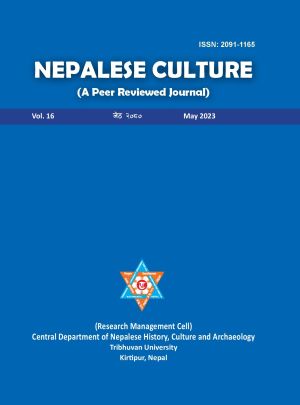उदयपुरस्थित चौदण्डीगढीको पुरातात्विक अन्वेषण {Archaeological Exploration of Chaudandi Gadhi Udayapur}
DOI:
https://doi.org/10.3126/nc.v16i1.54158Keywords:
Chaudandi Gadhi, archaeological, antiquities, fort, warAbstract
चौदण्डीगढी उदयपुर जिल्ला चौदण्डी नगरपालिका वडा नं. १ चौदण्डी डाँडामा अबस्थित छ । ऐतिहासिक चौदण्डी गढी सामरिक तथा पुरातात्विक हिसाबले एक महत्वपूर्ण सम्पदा हो । यो स्थान समुन्द्र सतहबाट ३००० फिट उचाई रहेको पूर्व पश्चिम फैलिएको महाभारत पर्वत श्रृङ्खलामा पर्दछ । चौदण्डी गढीको यस पुरातात्विक सोधअध्ययनले गढीको ऐतिहासिक तथा पुरातात्विक तत्थ्यहरुबारेमा जानकारी प्राप्त गर्न सहयोग पु¥याउनेछ । मध्यकालिन इतिहास बोकेको चौदण्डी गढीको पुरातात्विक संरचनाको वर्तमान अबस्थालाई बिषय वस्तुको रुपमा लिई यो सोध अध्ययनले त्यसको विश्लेषण गर्न खोजेको छ । यो अध्ययन अनुसन्धानको स्वरुपका दृष्टिले एक अन्वेषणात्मक प्रकृतिको गुणात्मक अध्ययन हो । यसमा प्राथमिक तथा द्वित्तीय स्रोतहरुबाट तथ्यांकहरु संकलन गरिएका छन् । प्राथमिक स्तरका तथ्यांकहरु ऐतिहासिक तथा पुरातात्विक गढीको स्थलगत अबलोकन गरी प्राप्त भौतिक स्मारकहरुको नापजाच र गढी संरक्षण समिति एवं बिभिन्न जानकार व्यक्तिहरुसंग अन्तरबार्ताहरु गरी संकलन गरिएका छन् । त्यसैगरी द्वित्तीय स्तरका तथ्यांकहरु यस चौदण्डी गढीसँग सम्बन्धि प्रकाशित बिभिन्न पुस्तकहरु, अप्रकाशित पुस्तक, पत्रपत्रिका, लेख रचना, गाँउघरमा प्रचलित किबदन्ती, सामाजिक संजाल, इन्टरनेटको समेत उपयोग गरी संकलन गरिएको छ । यो अध्ययन गर्नुका प्रमुख उद्देश्यहरुमा चौदण्डी गढीको ऐतिहासिक पक्ष के कस्तो छ ? गढीमा के कस्ता भौतिक तथा पुरातात्विक संरचनाहरु छन् ? गढीका पुरातात्विक तथा ऐतिहासिक वस्तुहरू के कस्तो अबस्थामा छन् ? भन्ने अनुसन्धान प्रश्नको जवाफ प्राप्त गर्र्ने रहेको छ । चौदण्डी गढीको अस्तित्व मध्यकालीन समयमा थियो भन्ने कुरा प्राप्त पुरातात्विक बस्तुहरूले प्रमाणित गरेको छ । नेपाल भौगोलिक एकीकरणको अभियान बि.सं. १८३१ पछि आधुनिक नेपालको इतिहास सुरुआतसगै चौदण्डी गढीको अस्तित्व पनि समाप्त भएको देखिन्छ । मध्यकालीन समयको ठानिएको यो गढीमा तत्कालीन अवस्थामा सेनहरूको अधिपत्यमा थियो भने कार्यकारी रुपमा किरातहरुले स्थानीय शासन संचालन गरेका थिए । प्राप्त नवपाषाण युगका हतियारले यो गढी बढीमा ४००० वर्ष प्राचीन रहेको देखिएकोले यसको अस्तित्व र किरातीहरु उपस्थिति यस क्षेत्रमा प्रागइतिहासकालदेखि नै रहेको प्रमाणित हुन आउँछ । अर्को महत्वपूर्ण पुरातात्विक प्रमाण भनेको यस क्षेत्रमा भेटिएका पुलिक तथा प्वालो मालाहरू हुन् । यस्ता पुरातात्विक बस्तुहरू चौदण्डी गढी र मकवानपुर गढीमा भेटिएका उस्तै प्रकृतिका छन्, जसको आधारमा यी गढीहरू समकालीन थिए भन्ने तत्थ्य पनि प्रकाशित हुन आउँछ ।
{Chaudandi Gadi is an important heritage site located in Chaudandi Municipality, ward no.1, situated at an altitude of 3000 feet above sea level in the Mahabharat Range. This research aims to investigate the historical and archaeological context of the fort, as well as its current condition. To accomplish this goal, explorative qualitative research methods have been followed, utilizing both primary sources such as field studies and stakeholder interviews, and secondary sources like published and unpublished literature, newsletters, articles, folklore, and online resources. The research aims to answer three primary questions: What is the historical significance of Chaudandi Gadi? What is the nature of the physical archaeological structures found at the site? And what is the present state of the historic structures located within the fort? Archaeological evidence suggests that the fort was active during the medieval period of Nepal, and was owned by the Kirants who utilized it for military purposes. However, after the unification campaign of 1831 BS, the fort's integrity seems to have been declined. The discovery of Neolithic tools at the site suggests that the Kiranti people may have inhabited the area for thousands of years. Additionally, the finding of Dzi beads (Pulik mala) similar to those found in Udayapur Gadhi indicates that both forts were constructed during the same period}.
Downloads
Downloads
Published
How to Cite
Issue
Section
License
© Central Department of Nepalese History, Culture and Archaeology, Tribhuvan University




